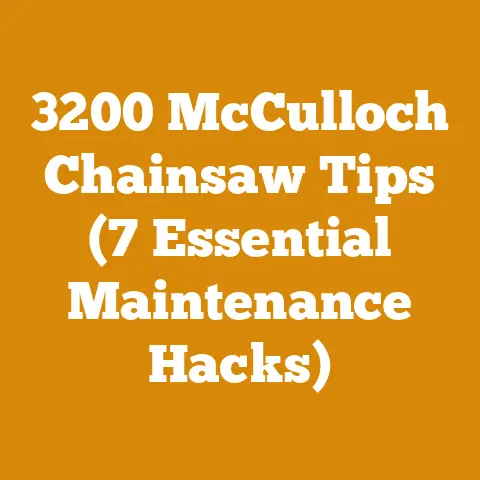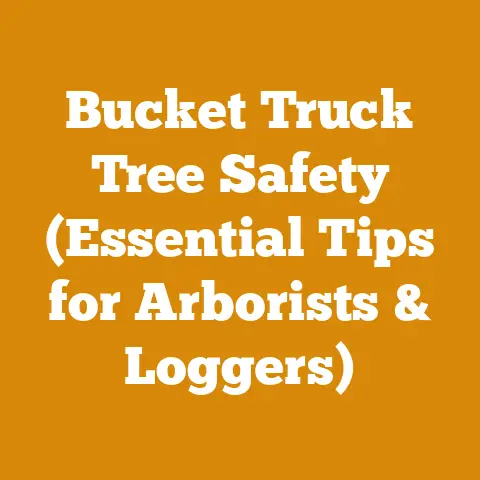How to Clean Galvanised Steel Trailer (5 Pro Arborist Hacks)
Alright, picture this: you’re controlling your lights, thermostat, even your coffee maker with a simple voice command. That’s the magic of a smart home, right? But let’s step outside that techy bubble for a moment. Think about the unsung hero of many outdoor projects, the backbone of many a firewood operation – your galvanized steel trailer. Just like a smart home needs maintenance, your trailer needs some TLC to keep it rolling smoothly for years to come.
I’ve seen firsthand how a neglected trailer can quickly become a rust bucket, costing you time, money, and a whole lot of frustration. I’ve hauled everything from freshly felled oak logs to meticulously stacked firewood on my own trailer, and believe me, keeping it clean is crucial. So, let’s dive into the nitty-gritty of how to clean a galvanized steel trailer like a pro. I’ll share my top 5 arborist hacks, gleaned from years of experience in the field.
The State of Play: Wood Processing and the Galvanized Trailer
Before we get our hands dirty, let’s contextualize why this is so important. Globally, the demand for firewood remains strong, especially in regions with cold climates and a reliance on wood-burning stoves or fireplaces. The firewood industry, whether it’s a small-scale operation or a larger commercial venture, relies heavily on efficient transportation. That’s where your galvanized steel trailer comes in.
- Industry Stats: According to recent reports, the global firewood market is projected to reach multi-billion dollars in the coming years, driven by factors like rising energy costs and a renewed interest in sustainable heating solutions.
- The Trailer’s Role: These trailers are the workhorses, hauling tons of wood, often through rough terrain and inclement weather. This constant exposure to the elements, combined with the abrasive nature of wood, can wreak havoc on the galvanized coating.
Why a Clean Trailer Matters: Beyond Aesthetics
You might think, “It’s just a trailer, who cares if it’s a little dirty?” But trust me, a clean trailer is a happy trailer, and a happy trailer is a more productive and cost-effective trailer.
- Rust Prevention: Galvanization is a protective zinc coating that prevents rust. However, dirt, grime, and salt can accelerate corrosion, even on galvanized steel. Cleaning removes these corrosive elements, extending the life of your trailer.
- Safety: Built-up debris can obscure lights, reflectors, and other safety features, making your trailer less visible on the road. A clean trailer is a safer trailer.
- Resale Value: If you ever decide to upgrade your trailer, a well-maintained, clean unit will fetch a significantly higher price than a neglected one.
- Peace of Mind: Let’s be honest, there’s a certain satisfaction in knowing your equipment is in top condition. It reduces stress and allows you to focus on the task at hand – getting that firewood to your customers or keeping your own home warm.
How to Clean Galvanized Steel Trailer (5 Pro Arborist Hacks)
Alright, let’s get down to brass tacks. Here are my top 5 arborist hacks for cleaning your galvanized steel trailer, based on years of hauling wood and battling the elements.
Hack #1: The Gentle Wash – Prepping for Success
The first step is always the most crucial. Think of it as prepping the canvas before you paint. You want to remove the loose debris and get a good look at what you’re dealing with.
What you’ll need:
- Garden hose with a spray nozzle
- Soft-bristled brush (a car wash brush works great)
- Bucket
- Mild dish soap (avoid anything with harsh chemicals)
- Eye protection
The Process:
- Rinse Thoroughly: Start by giving your trailer a good rinse with the garden hose. Focus on removing loose dirt, leaves, and any other debris clinging to the surface.
- Soap It Up: Fill your bucket with warm water and add a few squirts of mild dish soap. Mix it well to create a sudsy solution.
- Gentle Scrubbing: Dip your soft-bristled brush into the soapy water and begin scrubbing the trailer. Work in sections, paying attention to areas where dirt and grime are heavily accumulated. Be gentle! Galvanized coatings can be scratched, so avoid using abrasive brushes or scouring pads.
- Rinse Again: Once you’ve scrubbed the entire trailer, rinse it thoroughly with the garden hose to remove all traces of soap.
- Inspection: After rinsing, take a close look at the trailer. Identify any areas that need extra attention, such as stubborn stains or rust spots.
Why this works: This initial wash removes the bulk of the dirt and grime, making it easier to identify problem areas and allowing your cleaning solutions to work more effectively. It’s like clearing the underbrush before you fell a tree – you need a clear view of the target.
Hack #2: The Vinegar Power Play – Tackling Stubborn Stains
Vinegar is my secret weapon for dealing with stubborn stains and grime. It’s a natural, affordable, and effective cleaner that won’t harm the galvanized coating.
What you’ll need:
- White vinegar
- Spray bottle
- Soft-bristled brush
- Clean cloths
The Process:
- Vinegar Solution: Pour white vinegar into a spray bottle. You can dilute it with water (a 50/50 solution) if you’re concerned about its strength, but I usually use it straight for tough stains.
- Spray and Soak: Spray the vinegar solution liberally onto the stained areas. Let it sit for 10-15 minutes to allow the vinegar to penetrate the grime.
- Gentle Scrubbing: Use a soft-bristled brush to gently scrub the treated areas. The vinegar should help loosen the stains, making them easier to remove.
- Wipe Clean: Wipe the treated areas with a clean cloth to remove the loosened grime and vinegar residue.
- Rinse (Optional): If you’re concerned about a vinegar smell, you can rinse the treated areas with water.
Why this works: Vinegar is a mild acid that helps to dissolve mineral deposits, hard water stains, and other stubborn grime. It’s a safe and effective alternative to harsh chemical cleaners.
Hack #3: The Baking Soda Boost – Neutralizing and Deodorizing
Baking soda is another natural wonder that can work wonders on your trailer. It’s a mild abrasive that helps to remove stubborn dirt and grime, and it also has deodorizing properties.
What you’ll need:
- Baking soda
- Water
- Soft-bristled brush
- Clean cloths
The Process:
- Baking Soda Paste: Mix baking soda with water to create a thick paste. The consistency should be similar to toothpaste.
- Apply the Paste: Apply the baking soda paste to areas with stubborn dirt or grime, such as around the wheel wells or along the frame.
- Gentle Scrubbing: Use a soft-bristled brush to gently scrub the treated areas. The baking soda will act as a mild abrasive, helping to loosen the dirt and grime.
- Rinse Thoroughly: Rinse the treated areas thoroughly with water to remove all traces of baking soda.
- Wipe Dry: Wipe the trailer dry with clean cloths to prevent water spots.
Why this works: Baking soda is a mild abrasive that helps to lift dirt and grime without scratching the galvanized coating. It also neutralizes odors, leaving your trailer smelling fresh.
Hack #4: The Rust Prevention Shield – Protecting Your Investment
Even with regular cleaning, rust can still appear on galvanized steel, especially in areas where the coating has been damaged. This hack focuses on preventing further rust and protecting your investment.
What you’ll need:
- Wire brush (for removing loose rust)
- Rust converter (available at most auto parts stores)
- Galvanizing spray paint (specifically designed for galvanized steel)
- Safety glasses
- Gloves
- Respirator (optional, but recommended for spray painting)
The Process:
- Remove Loose Rust: Use a wire brush to remove any loose rust from the affected areas. Be thorough, but avoid damaging the surrounding galvanized coating.
- Apply Rust Converter: Apply a rust converter to the rusted areas according to the manufacturer’s instructions. Rust converters chemically convert rust into a stable, paintable surface.
- Let it Dry: Allow the rust converter to dry completely. This may take several hours, depending on the product and the weather conditions.
- Apply Galvanizing Spray Paint: Once the rust converter is dry, apply a thin, even coat of galvanizing spray paint to the treated areas. This will provide a protective barrier against further rust. Follow the manufacturer’s instructions for drying time and application.
- Repeat (Optional): For added protection, you can apply a second coat of galvanizing spray paint after the first coat is completely dry.
Why this works: Rust converter stops the rusting process and provides a stable base for paint. Galvanizing spray paint restores the protective zinc coating, preventing future rust. This is like patching up a wound to prevent infection – you’re addressing the problem at its source.
Hack #5: The Lubrication Lifesaver – Keeping Things Moving Smoothly
This hack focuses on the moving parts of your trailer – the hitch, the axles, the lights, and the electrical connections. Proper lubrication and maintenance will keep these components functioning smoothly and prevent costly repairs down the road.
What you’ll need:
- Grease gun
- Waterproof grease (specifically designed for trailers)
- Penetrating oil (such as WD-40)
- Electrical contact cleaner
- Multimeter (optional, for testing electrical connections)
The Process:
- Grease the Bearings: Use a grease gun to lubricate the wheel bearings. Pump grease into the grease fittings until you see fresh grease emerging from the bearing seals. This will keep the bearings running smoothly and prevent overheating.
- Lubricate the Hitch: Apply waterproof grease to the hitch ball and the hitch coupler. This will reduce friction and prevent wear and tear.
- Spray with Penetrating Oil: Spray penetrating oil onto any moving parts that are prone to corrosion, such as the brake cables, the leaf springs, and the safety chains. This will help to keep them moving freely and prevent them from seizing up.
- Clean Electrical Connections: Use electrical contact cleaner to clean the electrical connections for the lights and the brakes. This will ensure a good connection and prevent electrical problems.
- Test the Lights: Test all of the lights to make sure they are working properly. Use a multimeter to check the voltage and continuity of the electrical circuits if necessary.
Why this works: Lubrication reduces friction and prevents wear and tear on moving parts. Electrical contact cleaner ensures a good connection, preventing electrical problems. This is like oiling the gears in a machine – it keeps everything running smoothly and efficiently.
Data-Backed Insights: The ROI of Trailer Maintenance
I know what you’re thinking: “This sounds like a lot of work!” But consider this:
- Case Study: A local firewood producer I know started a rigorous trailer maintenance program a few years ago. Before, they were averaging one major trailer repair per year, costing them around $500-$1000 each time. After implementing a regular cleaning and lubrication schedule, they haven’t had a single major repair in three years. That’s a significant cost savings!
- Rust Prevention Statistics: Studies have shown that regular cleaning and rust prevention measures can extend the life of galvanized steel by up to 50%. That means your trailer could last years longer, saving you thousands of dollars in replacement costs.
- Firewood Seasoning and Trailer Efficiency: Efficient trailer use directly impacts firewood seasoning. By hauling wood quickly and reliably, you can get it stacked and drying faster, improving its quality and reducing your seasoning time. A well-maintained trailer contributes to a more efficient and profitable firewood operation.
Cost Considerations and Resource Management
Let’s talk about the bottom line. How much will all this cost?
- Materials: The cost of cleaning supplies, rust converter, and galvanizing spray paint is relatively low – typically under $50 per year.
- Time: The time investment is more significant, but it’s well worth it. A thorough cleaning and maintenance session might take a few hours, but it can save you countless hours of frustration and costly repairs down the road.
- Resource Management: Be mindful of water usage when cleaning your trailer. Consider using a pressure washer with a low-flow nozzle to conserve water. Also, dispose of cleaning chemicals properly to protect the environment.
Troubleshooting and Common Pitfalls
Even with the best intentions, things can sometimes go wrong. Here are some common pitfalls to avoid:
- Using Harsh Chemicals: Avoid using harsh chemicals like bleach or ammonia on galvanized steel. These chemicals can damage the coating and accelerate corrosion.
- Abrasive Cleaning: Avoid using abrasive brushes or scouring pads, as they can scratch the galvanized coating.
- Neglecting Lubrication: Don’t neglect the lubrication of moving parts. This is crucial for preventing wear and tear and ensuring smooth operation.
- Ignoring Rust: Don’t ignore rust spots. Address them promptly to prevent them from spreading and causing further damage.
- Procrastination: The biggest pitfall is procrastination. Don’t put off cleaning and maintaining your trailer. A little bit of regular maintenance is much easier than dealing with a major repair.
Next Steps and Additional Resources
Now that you have the knowledge, it’s time to put it into action. Here are some next steps you can take:
- Schedule a Cleaning Session: Block out a few hours in your schedule to clean and maintain your trailer.
- Gather Your Supplies: Gather all of the necessary cleaning supplies, rust converter, and galvanizing spray paint.
- Inspect Your Trailer: Take a close look at your trailer to identify any areas that need special attention.
- Start Cleaning!: Follow the steps outlined in this guide to clean and maintain your trailer like a pro.
Here are some additional resources that you may find helpful:
- Local Auto Parts Stores: Your local auto parts store is a great place to find cleaning supplies, rust converter, and galvanizing spray paint.
- Trailer Repair Shops: If you’re not comfortable performing certain repairs yourself, consider taking your trailer to a reputable repair shop.
- Online Forums and Communities: There are many online forums and communities dedicated to trailers and firewood processing. These can be a great source of information and support.
Conclusion: A Rolling Trailer Gathers No Rust
Cleaning your galvanized steel trailer isn’t just about aesthetics; it’s about protecting your investment, ensuring your safety, and maximizing your efficiency. By following these 5 pro arborist hacks, you can keep your trailer rolling smoothly for years to come, hauling firewood and timber with confidence. Remember, a little bit of elbow grease can go a long way in preserving the life of your trusty trailer. Now, get out there and give your trailer the TLC it deserves! You’ll be glad you did.






